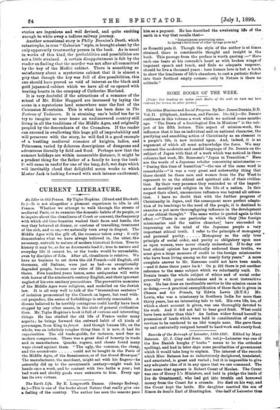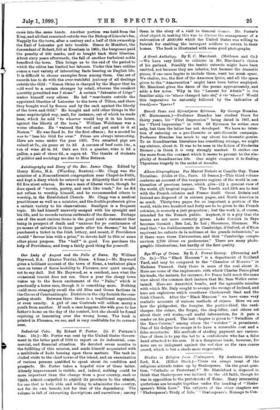Records of the Borough of Leicester, 1103-1327. Edited by Mary
Bateson. (C. J. Clay and Sons. 25s. net.)—Leicester was one of the five Danish burghs (" burhs " seems to be the orthodox spelling), and had in later days some peculiarities of government which it would take long to explain. The interest of the records which Miss Bateson has so industriously deciphered, translated, and annotated, is great and varied ; but it is impossible to give any adequate idea of it in any space that we can command. The first name that appears is Robert Count of Meulan. The Count was one of Henry L's Ministers, and held in pledge the lands of Ivo de Grantmesnil, who had got into trouble and borrowed money from the Count for a crusade. Ivo died on his way, and the Count kept the lands. His daughter married the son of Simon de Senlis Earl of Huntingdon. One-half of Leicester thus came into the same hands. Another portion was held from the King, and all that remained outside was the Bishop of Lincoln's fee, Happily for the town, after a century and a half of this ewnership the Earl of Leicester got into trouble. Simon de Montfort, the descendant of Robert, fell at Evesham in 1265; the burgesses paid the penalty of 500 marks, and so bought back their liberties. About sixty years afterwards, the fall of another turbulent noble benefited the town. This brings us to the end of the period to which the editor has limited her labours. Under this bare outline comes a vast variety of interesting facts bearing on English life. It is difficult to choose examples from among them. One set of records has to do with the ever-watchful jealousy of all dealings outside the Gild : "Simon Skine is charged by the Mayor that he sold wool to a certain stranger by retail, whereas the smallest quantity permitted was 7 stone." A certain "Jakemim of Liege" makes himself very odious. He led "merchants outside the appointed liberties of Leicester to the town of Tilton, and there they bought wool by fleeces and by the sack against the liberty of the town and Gild." He bought and sold other things in the same unprincipled way, malt, for instance, out of which he made beer, which he sold "to whoever would buy it in his house, against the liberty of the town." William Welshman was a worse offender. He "watered the wool and put sand in it at Boston." He was fined 2s. for the first offence ; for a second he was to "lose his Gild for ever." Prices are always interesting. Here are some under the year 1301. Two unsalted pigs are valued at 7s., six geese at ls. 3d. A carcase of beef costs 14s., a tun of wine 1.3 4s. 2d. Oats are 31d. a quarter, wine is 6d. a gallon, a pair of shoes 6d., a capon 4d. The thanks of students of politics and sociology are due to Miss Bateson.
















































 Previous page
Previous page